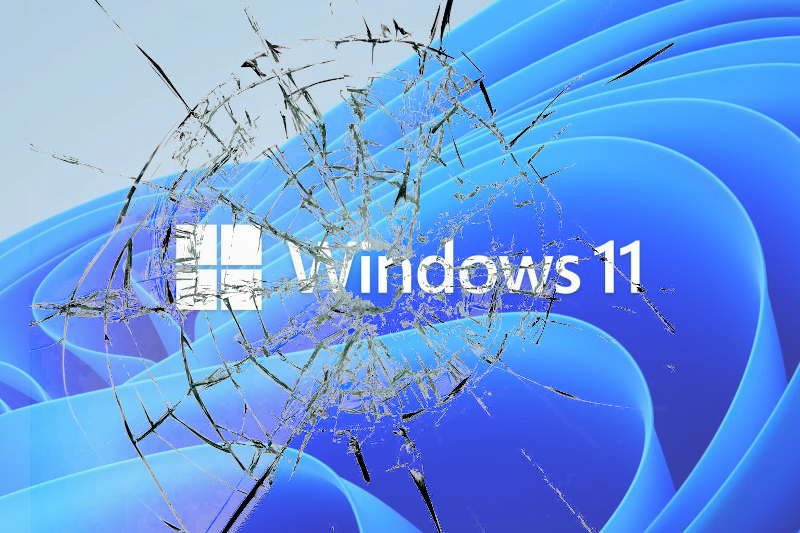
It’s a natural feeling to crave the next big thing especially when it comes to technology. The desire to be on the forefront of tech is why things like the newest iPhone models go out of stock so often. With each upgrade that comes to a piece of tech, there is usually a multitude of added features and new ways to interact. The latest operating system released by Microsoft, Windows 11, is no different. Featuring a countless amount of enhancements and design changes, Windows 11 provides a fresh coat of paint to any computer that supports it. Surely, being the latest and greatest operating system must mean that it’s better than the rest, right? Should you upgrade to Windows 11?
Not so fast! Just because Windows 11 is here doesn’t mean that you are ready for it, especially if you had been considering it for your business. While Windows 11 would likely make your computer experience feel renewed, there are actually quite a few reasons why you may want to hold off for a bit before considering implementing it into your company’s workflow.
So why might it not be a good time for your business to upgrade to Windows 11? Read on to find out!
The technology used to support a business is arguably one of its most valuable assets. The computers in use at your business are a key component of that technology. And in order to maintain their value, the computers being used need to remain stable and reliable. They must also continue to operate properly in tandem with not only you but with the other pieces of technology in your organization. With these facts in mind, there are a few reasons why moving to Windows 11 at your company may not be a wise move for now.
Software Compatibility
Most software that is compatible with Windows 10 will also work on Windows 11. But software compatibility isn’t quite as simple as that. If your business runs any custom-designed applications or services, they may need to go through extensive testing and debugging first to ensure that there is nothing in Windows 11 changes that will break their functionality.
It is important that anything and everything that your business relies on within their computer get tested with extreme care on any new operating system before it is rolled out into production. And that type of testing should not be rushed.
Bugs, issues, and crashes. Oh my!
There’s a lot to love about Windows 11. But there’s plenty to groan at as well. The release of Windows 11 by Microsoft has uncovered its fair share of bugs and problems. Microsoft publicly catalogs and addresses some of them while plenty more have been discovered and disclosed by the I.T. community.
Sound familiar? This tends to be the case with the launch of most new operating systems. The general rule of thumb to ensure the best computer stability is to wait a bit for the kinks to get worked out.
Hardware Uniformity
Unless your business performs a strict hardware refresh on a scheduled basis, it is likely that your organization’s computers have varying specs. Due to stricter hardware requirements, a PC is not guaranteed to support Windows 11 even if it is currently running Windows 10. Microsoft has tightened the reigns on their required hardware specs such as requiring a TPM 2.0 chip, attempting to do a mass roll out of Windows 11 could potentially result in a mixed environment which becomes harder to support.
Windows 10 isn’t going anywhere
Windows 11 is here but it doesn’t mean that Windows 10 is riding off into the sunset anytime soon. Microsoft will continue to process feature updates, security fixes, and enhancements regularly. Windows 10 is still very much a fully supported operating system that Microsoft will not be discontinuing support for until October 14th, 2025. There’s plenty of time for Windows 10 and Windows 11 to co-exist while the latter continues to mature.
Windows 10 is actually pretty great!
A computer’s operating system tends to act more like a fine wine than a fresh fruit. Instead of being in its best form early in its development, it only gets better with age. Although Windows 10 is now the de facto standard for Microsoft-based computers around the globe, it took quite a few updates and revisions to the operating system before I.T. professionals were no longer apprehensive about integrating it into their environments. Windows 10 has become an overall stable and pleasant experience following all of its initial growing pains. There is no doubt that Windows 11 will go through the same lifecycle.
Windows 11 is on track to become a worthwhile inclusion into your company’s technology stack. But when it comes to running your business with efficiency, it is much more important to use and maintain the best of the best and not the newest of the new. Your organization needs stability and it is likely that the answer to that stability is to maintain the status quo while Windows 11 goes through various stages of enhancements and fixes.
Here at Diligex, we take special care when it comes to helping your business maintain its stability. Our team proactively monitors the state of affairs surrounding the technology that your business operates on in order to help you get the most out of your devices and services. If you are already a Diligex Managed I.T. subscriber, we’ll be sure to let you know when Windows 11 would be a great fit for your environment.
Not currently a Diligex Managed I.T. subscriber? Contact us and a member of our team will be in touch to discuss how Diligex can help your business thrive.
